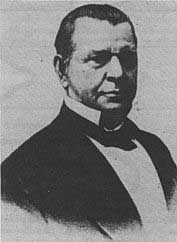Oliver Fisher Winchester (Oliver Fisher Winchester)

Businessman. He is best remembered for the manufacturing and marketing the Winchester repeating rifle, which gained the reputation as “the gun that won the West.” He began his business career as a clothing manufacturer in New York City, New York and New Haven, Connecticut. During this period he discovered that a division of Smith & Wesson firearms was failing financially with one of their newly patented arms. Eager for an opportunity to capitalize on the firearms market, he and other stockholders acquired the division, better known as the Volcanic Repeating Arms Company, in 1850. By 1857 he had positioned himself as the principal stockholder in the company and relocated to New Haven, changing the name to New Haven Arms Company. Plagued by sluggish sales, which was in part attributed to the design and poor performance of the Volcanic cartridge, he inherited a brilliant engineer, Benjamin Tyler Henry, who would prove an invaluable asset. Henry sought to improve on the Volcanic repeating rifle, by enlarging the frame and magazine to accommodate seventeen of his newly redesigned, all-brass case, .44 caliber rimfire cartridges. This new cartridge revolutionized the firearms industry, putting the new company on the map, and Henry’s ingenuity was rewarded with a patent in his name in October 1860, for what was to become the famous Henry rifle. Following the success of the Henry rifle, the company was reorganized once more and renamed the Winchester Repeating Arms Company. In 1866, employee Nelson King’s new improved patent remedied flaws in the Henry rifle by incorporating a loading gate on the side of the frame and integrating a round sealed magazine which was covered by a fore stock. The first Winchester rifle was the Model 1866. While repeating rifles were used to some extent in the American Civil War, the US Army concentrated primarily on perfecting breech-loading single shot rifles for many more years. Repeating rifles were not widely used until after the war, when they became increasingly popular with civilians. He was also involved in politics, serving as a New Haven City Commissioner, Republican Presidential elector in 1864, and as Lieutenant Governor of Connecticut from 1866 until 1867. He died at the age of 70. (bio by: William Bjornstad) Family links: Spouse: Jane Ellen Hope Winchester (1807 – 1898)* Children: Anne Rebecca Winchester Dye (1835 – 1864)* William Wirt Winchester (1837 – 1881)* Hannah Jane Winchester Bennett (1847 – 1920)* *Calculated relationship
Born
- November, 30, 1810
- USA
Died
- December, 12, 1880
- USA
Cemetery
- Evergreen Cemetery
- Connecticut
- USA

